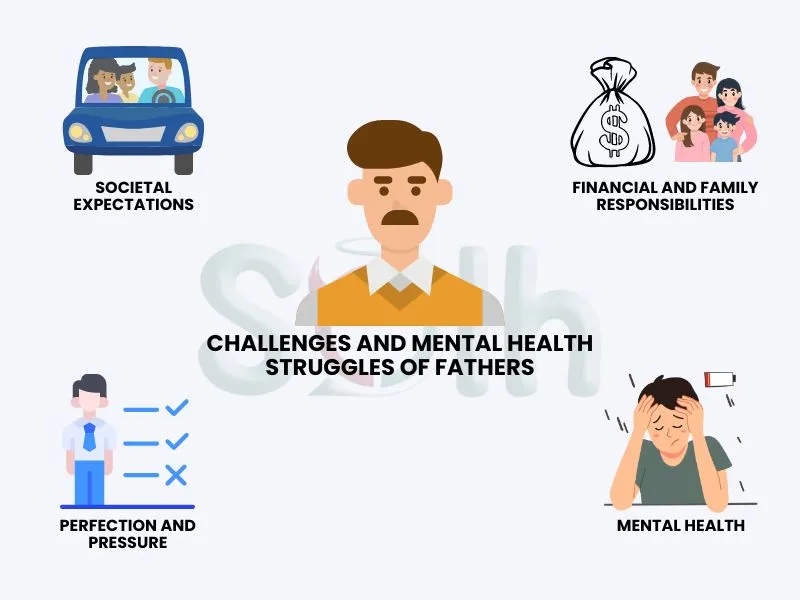Fatherhood is filled with an array of emotions and experiences - both good and bad. The joys and happy moments include the opportunity to nurture your child and shape them as individuals. Providing guidance, love and support to your child, being there for them along their milestones, and watching them grow up into strong individuals is a magical journey. Fathers play a huge role in the lives of their children.
As we celebrate Father’s Day, it’s essential to take a look at both sides of the coin. While it is an incredible experience, we also need to honor the sacrifices and stress that fathers go through. The pressures associated with motherhood are talked about often, but the contributions of fathers often go unnoticed. It's important to reflect on the pressures and expectations placed on fathers, especially the pervasive notion of perfectionism. Perfectionism, which is the relentless pursuit of flawlessness, can be a heavy burden. Let’s reflect on the expectations that are placed on fathers and why it is important to allow room for embracing imperfections to be able to celebrate the true essence of being a father.
The Challenges of Fatherhood
Fathers have a lot of responsibilities on their head. Traditionally, they are expected to always be strong and provide for their family. They are the caretakers and the breadwinners, responsible for financial stability. The pressure of being the ‘head’ of the family and taking responsibility can be a lot to handle, especially during trying or turbulent times. With all these societal expectations, there is often not too much room for making mistakes. Fathers are forced to be perfect and take charge to ensure their family’s well-being. Combine this with the fact that men struggle to talk openly about their mental health, and we have a catastrophe on our hands!
Did you know - suicide rates are 2.5 times higher in Indian men as compared to women? National Crime Records Bureau data showed that 1.18 lakh men had died by suicide as against 45,026 women in 2019-2021. This high number is attributed to family, economic and health-related reasons. It has also been observed that in men, the level of education has no bearing on the rate of suicide, and married men are at the highest risk.

The Weight of Perfectionism for Fathers
As discussed above, fathers often feel huge amounts of pressure to be perfect. This pursuit of perfection can lead to significant mental health issues. Balancing fatherhood and work is a big modern problem faced by fathers. Fathers feel the need to excel in their careers while being emotionally available and actively participating in parenting. This can result in increased stress, anxiety, and imposter syndrome—the feeling of being inadequate despite evident success.
From childhood, many men are taught to suppress their emotions, perpetuating the cycle of toxic masculinity. This ingrained belief system not only affects their mental health but also impacts their ability to connect authentically with their children and partners.
Single fathers and first-time fathers may face a bigger array of challenges. Single fathers often juggle multiple roles as primary caregivers, providers, and homemakers, leading to significant physical and emotional strain. They may experience social stigma, financial pressure, and a limited support network, which can exacerbate feelings of isolation and stress. First-time fathers, on the other hand, often struggle with a steep learning curve, sleep deprivation, and balancing work-life commitments. The emotional adjustment to fatherhood, relationship changes, and the pressure of perfectionism can further complicate their journey.
The concept of toxic masculinity further compounds these challenges - it dictates that men must be strong, aggressive, reject any traits deemed feminine including most emotions, and are only worthy if they possess money, power, status, and influence.
How Fathers can Embrace Imperfection
We have seen how the weight of perfection can weigh fathers down. Overcoming this involves adopting a mindset that values progress over perfection and prioritizes well-being. Here are some strategies for fathers to embrace their imperfections and foster a healthier approach to parenting:
1. Practice Self-Compassion
Treat yourself with the same kindness and understanding that you would offer a friend. Acknowledge that no one is perfect and that making mistakes is a natural part of learning and growth.
2. Set Realistic Expectations
Understand that perfection is unattainable. Set achievable goals and recognize that it's okay to have imperfections. Celebrate small victories and progress rather than focusing on flaws. This will help you be more gentle with yourself.
3. Seek Support
Don't hesitate to reach out for support from partners, family, friends, or professionals. Sharing experiences and challenges with others can provide valuable insights and emotional relief.
4. Focus on the Present
Mindfulness practices can help fathers stay present and reduce the anxiety associated with perfectionism. Engaging fully in the moment enhances the quality of interactions with children and promotes a sense of fulfillment.
5. Challenge Negative Self-Talk
Be aware of your thoughts. It is easy to slip into patterns of self hatred because over time, such thoughts become automatic in nature. When you are faced with a negative thought, take a step back and question its validity. Refer to past experiences and find evidence to support or reject your thoughts.
Some Simple Tips for Fathers
When we talk about topics like perfectionism and toxic masculinity, we need to understand that these ways of thinking are learned, and systematically ingrained into our mind. We all fall victim to these ways of thinking, but realizing that they are not right is the first step to changing. Here are some tips for fathers to keep in mind:
1. Don't be afraid of vulnerability
Vulnerability is a strength, not a weakness. Expressing your emotions openly will help you connect with others on a deeper level, while also setting an example for your kids. It will teach them that it is okay to talk about your feelings. Embracing your emotions will also allow you to be more present, attuned to yourself, and help you excel in all areas of life.
2. Making mistakes is okay
Mistakes are opportunities for growth and learning. It is a natural part of life and parenting. Rather than being afraid of making mistakes, try to learn from them. Evaluate where things went wrong, discuss them openly, and try to draw learnings along the way. Allowing yourself to make mistakes will help you build self-trust.
3. Reaching out for help does not make you weak
It is not true that being stoic and strong has to come from an absence of emotions. If you’re struggling, it is completely okay to reach out for help. This can be help from your spouse, your friends, family, colleagues, or even from a mental health professional. Everyone requires a helping hand at times, there is nothing to be ashamed about.
4. Find balance for yourself
Finding balance means balancing work and family life, which, of course, is crucial. However, in the process, don’t forget to set time away for yourself. You take precedence over your responsibilities, be it related to work or home. Try to set realistic expectations, delegate tasks, and prioritize self-care. In turn, when you take care of your well-being, you will be better equipped to support your family.
5. You can break the cycle
Realize that you have the power to break the cycle of toxic masculinity by modeling healthy behaviors to your children. Encouraging emotional expression and seeking help when needed teaches children that it's okay to be vulnerable and ask for support. When such thoughts are ingrained in children from a young age, they are easier to sprout into action later on.
Celebrate the Journey of Fatherhood!
Fatherhood and perfectionism are intertwined in complex ways. While the desire to be the best father possible is natural, striving for perfection can lead to stress, anxiety, and a sense of inadequacy. Embracing imperfections and prioritizing authentic connections with children are essential for a fulfilling fatherhood journey.
Solh Wellness can be your companion when you need a helping hand.
- Mood Meter - Track your emotions daily and see what makes you happy to work your way towards better mental health.
- Self-Assessment - Our self-assessment tests can help you keep your mental health in check, so you know when it is time to seek help.
- Community Support - Humans are social creatures. Strong social connections are essential for well-being. Our support groups can help you connect with a community that understands you. Equipped with the power of anonymity, so you can talk about what matters most.
- Talk to Professionals - Sometimes, navigating the path to fatherhood requires guidance and support. Don't hesitate to seek help from a therapist or counselor. Solh offers a "Talk Now" feature for immediate support during overwhelming moments.
Download the Solh Wellness Mobile App Android and iOS Versions
Happy Father’s Day to all the fathers out there!



